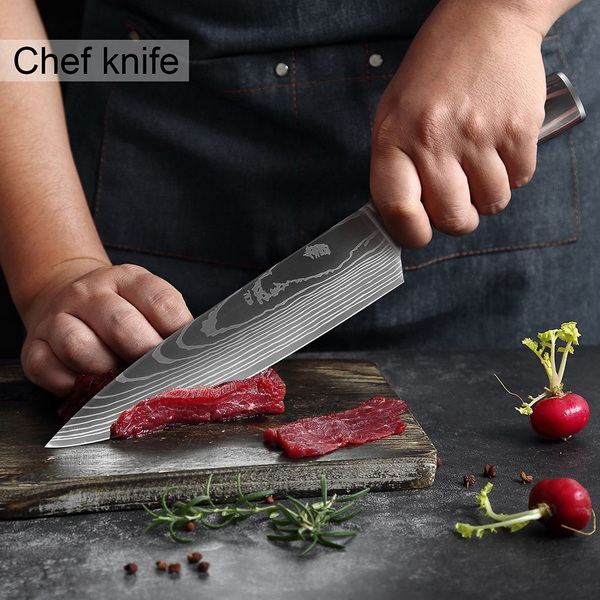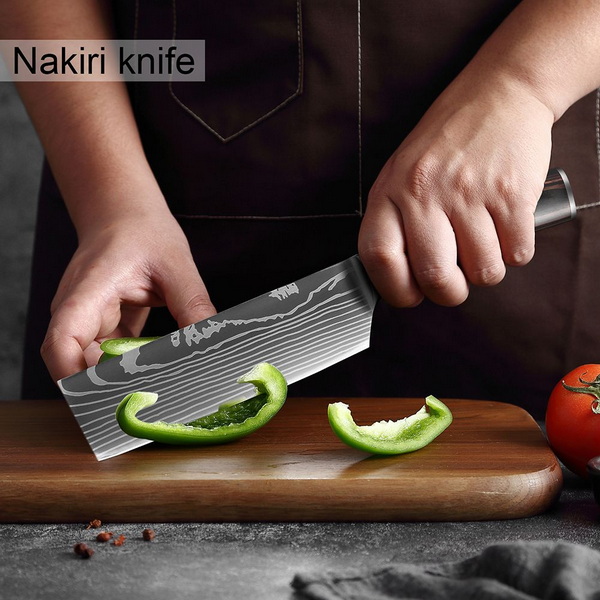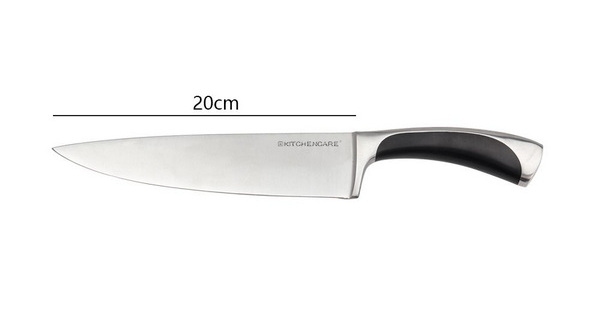

Views: 222 Author: Ella Publish Time: 2025-05-01 Origin: Site








Content Menu
● Why a Knife Set Makes the Perfect Gift
● Understanding the Recipient: Who Are You Gifting?
>> Specialty or Artistic Knife Sets
● Key Features to Look for in a Knife Set
>> Handle Material and Ergonomics
● How to Match a Knife Set to the Recipient's Cooking Style
● Aesthetic and Storage Options
● Knife Set Maintenance: What Every Gift Giver Should Know
● Top Knife Set Gift Recommendations
>> For the Culinary Adventurer
● How to Personalize Your Knife Set Gift
● Sustainability and Ethical Considerations
● FAQ: Five Key Questions Answered
>> 1. What are the essential knives every set should include?
>> 2. Should I choose a knife set with a block, magnetic strip, or case?
>> 3. Is it better to buy a large set or a few high-quality knives?
>> 4. How important is knife maintenance, and what should I tell the recipient?
Selecting the perfect knife set as a gift is both an art and a science. Whether you're shopping for a culinary enthusiast, a newlywed couple, or a friend who's just moved into a new home, a well-chosen knife set is a gift that combines beauty, utility, and lasting value. In this comprehensive guide, you'll discover how to choose the right knife set for a gift, what features to look for, and how to match your selection to the recipient's needs and style. Along the way, you'll find illustrative images and curated videos to help you visualize your options and make an informed decision.

A high-quality knife set is a gift that stands the test of time. Unlike gadgets that gather dust, knives are used daily in every kitchen, making them practical and thoughtful. They also symbolize new beginnings-perfect for weddings, housewarmings, graduations, or birthdays. A beautiful knife set can even become a centerpiece, adding sophistication and style to any kitchen.
A knife set is also a symbol of craftsmanship and care. The act of giving a knife set conveys a wish for abundance, good meals, and shared experiences. In some cultures, knives are considered a sign of respect and are believed to "cut away bad luck" when gifted with a coin to avoid severing the relationship. This blend of tradition and practicality makes a knife set a meaningful and memorable present.
Before you start shopping, consider the recipient's personality, lifestyle, and cooking habits. Are they a passionate home chef, a busy parent, or someone just starting out in the kitchen? Here are some common recipient profiles:
- The Practical Cook: Prefers essential, easy-to-maintain knives.
- The Culinary Adventurer: Loves experimenting with new recipes and ingredients.
- The Entertainer: Enjoys hosting and may need steak knives or specialty blades.
- The Aesthetic Enthusiast: Values design, color, and how the set complements their kitchen décor.
- The Beginner: Needs a simple, foolproof starter set.
Think about the recipient's kitchen space, storage options, and whether they value tradition or innovation. For example, a minimalist may appreciate a compact set with just the essentials, while a passionate foodie might love a collection of specialized blades.
Not all knife sets are created equal. Understanding the main categories will help you choose the most suitable option.
Typically include three to five essential knives: chef's, paring, utility, and bread knife. Ideal for minimalists and beginners.
- Pros: Affordable, compact, easy to store.
- Cons: May lack specialty knives for advanced tasks.
Often include eight to twelve pieces, covering all basic and many specialty knives (e.g., santoku, carving, boning), plus extras like shears and honing rods.
- Pros: Versatile, great for dynamic cooks.
- Cons: Require more storage, can be overwhelming for some.
Focus on multiple steak knives, often paired with prep knives-perfect for entertainers or families who love grilled meats.
- Pros: Consistent look, functional for gatherings.
- Cons: Take up space, may include knives that see less use.
Feature unique designs, artwork, or themes-ideal for those who appreciate aesthetics as much as function.
- Pros: Visually striking, conversation starters.
- Cons: Sometimes less practical for daily use.
Choosing the right knife set involves more than counting pieces. Here are the most important features to consider:
- Stainless Steel: Durable, rust-resistant, easy to maintain.
- High-Carbon Steel: Holds a sharper edge longer but requires more care.
- Damascus Steel: Combines sharpness with beautiful patterns, often found in premium sets.
- Wood: Classic, comfortable, but needs extra care.
- Composite/Resin: Durable, often ergonomic, less prone to cracking.
- Metal or Plastic: Long-lasting, but may be less comfortable for extended use.
A well-balanced knife feels comfortable and secure in the hand. Neither too heavy nor too light-look for a set that suits the recipient's hand size and strength.
A good set should include at least:
- Chef's knife
- Paring knife
- Bread knife
- Utility knife
Bonus points for santoku, carving, boning, and steak knives.
Some knives are dishwasher safe, while others require hand washing. High-carbon and Damascus steel need regular oiling and sharpening. Consider the recipient's willingness to maintain their knives.
Knife sets often come with blocks, magnetic strips, or cases. Choose a storage option that fits the recipient's kitchen and style.

The best knife set is one that matches how the recipient cooks.
- Vegetarian or Plant-Based: Japanese-style knives excel at slicing vegetables and delicate produce.
- Meat Lover: European blades offer durability and strength for cutting meats.
- Baker: Look for sets with high-quality bread knives.
- Entertainer: Sets with multiple steak knives and carving knives are ideal for dinner parties.
If the recipient enjoys global cuisines, consider sets that include specialty knives like a santoku, nakiri, or cleaver. For those who love outdoor cooking or barbecuing, robust knives with protective sheaths or portable cases are a thoughtful touch.
Knife sets are available at every price point. Here's how to navigate your options:
- Entry-Level ($50–$150): Good for beginners or occasional cooks. Look for forged stainless steel over stamped metal for better durability.
- Mid-Range ($150–$300): Offers premium materials, better balance, and more variety.
- High-End ($300+): Features like Damascus steel, handcrafted blades, and designer aesthetics. Ideal for enthusiasts and professionals.
Remember, a higher price doesn't always guarantee better performance, but it often reflects superior materials, craftsmanship, and longevity. Always compare warranties, return policies, and customer reviews before making a final decision.
A knife set can be a statement piece. Consider:
- Color Choices: From classic black and wood to bold colors and artistic designs.
- Matching Handles and Blades: For a cohesive look.
- Unique Storage Blocks: Modern, rustic, or minimalist styles to match kitchen décor.
Some brands offer customizable blocks or stands, allowing you to arrange knives for easy access and visual appeal. For small kitchens, wall-mounted magnetic strips or in-drawer organizers save space and keep blades safe.
To ensure your gift lasts, educate the recipient about basic care:
- Hand Wash Only: Most quality knives should not go in the dishwasher.
- Dry Immediately: Prevents rust and prolongs blade life.
- Sharpen Regularly: Whetstones or honing rods keep knives razor-sharp.
- Proper Storage: Use blocks, magnetic strips, or blade guards to protect edges.
Including a maintenance guide or a small bottle of blade oil with your gift adds a thoughtful touch. Some sets even come with built-in sharpeners or care kits, making upkeep easier for busy cooks.
Here are some highly recommended knife sets for different types of recipients:
- Zwilling Pro 3-Piece Starter Kit: Essential knives for everyday tasks, easy to maintain.
- Nomad Everest Gift Set: Hand-forged, full-tang knives with beautiful rosewood handles.
- Steak Knife Set: Includes multiple steak knives and prep blades for serving guests.
- Masterpiece Themed Knife Set: Artistic blades with iconic paintings, dishwasher safe.
- IMARKU 11-Piece Set: Ergonomic handles, comprehensive selection, and a durable block.
Adding a personal touch can elevate your gift from memorable to unforgettable. Consider these personalization ideas:
- Engraving: Many brands offer engraving on blades or handles, allowing you to add initials, a name, or a special date.
- Custom Storage Blocks: Choose a block that matches the recipient's kitchen or have one custom-made from a favorite wood.
- Gift Wrapping: Present the set in a decorative box or wrap it with a handwritten note explaining your choice.
- Recipe Cards: Include a few of your favorite recipes that make use of the knives in the set.
If your recipient values sustainability, look for knife sets made from responsibly sourced materials and ethical manufacturing processes. Many modern brands use recycled steel, sustainably harvested wood, and eco-friendly packaging. Some even partner with reforestation initiatives or donate a portion of proceeds to culinary education.
- Eco-Friendly Handles: Bamboo, recycled composites, or responsibly sourced hardwoods.
- Recyclable Packaging: Minimal plastic, biodegradable wraps, or reusable boxes.
- Ethical Brands: Research company policies on labor, sourcing, and community involvement.
Choosing the right knife set for a gift is about matching quality, functionality, and style to the recipient's needs and personality. By considering the types of knives included, the materials used, the design and ergonomics, and the maintenance required, you can select a set that will be cherished for years. Whether you opt for a minimalist starter kit, a comprehensive chef's collection, or an artistic showpiece, your thoughtful choice will make every meal a little more special.
A knife set is more than just a collection of tools-it's a daily companion in the kitchen, a symbol of care, and a catalyst for creativity. With the right knowledge and attention to detail, your gift will inspire delicious moments and lasting memories for years to come.

A basic set should have a chef's knife, paring knife, and bread knife. For more versatility, look for sets that add a utility knife, santoku, or carving knife.
This depends on the recipient's kitchen space and style. Blocks are classic and safe, magnetic strips save counter space and show off the knives, while cases are ideal for those with limited space or who travel frequently.
Quality trumps quantity. A few well-made knives are more valuable than a large set of mediocre blades. Choose a set that matches the recipient's actual cooking needs.
Proper care is essential for longevity. Advise hand washing, immediate drying, and regular sharpening. Some sets come with sharpeners or honing rods, but learning to use a whetstone is ideal for best results.
For vegetarians, Japanese-style knives excel at precise vegetable work. For meat lovers, European or full-tang knives provide the strength needed for cutting meats and bones. Choose a set that fits their primary cooking style.